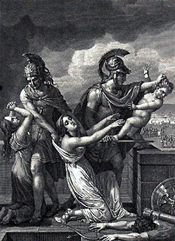
10 Feb 2008
MARTÍN Y SOLER: Andromaca
Andromaca: Dramma per musica in three acts.
Ermione: Azione tragica in two acts.
Ippolito ed Aricia: Tragedia in five acts.
Idomeneo: Opera seria in three acts.
Paride ed Elena: Dramma per musica in five acts.
Orphée: Opera in four acts.
Music composed by Christoph Willibald Gluck (arranged by Hector Berlioz, 1859). Libretto by Ranieri de' Calzabigi
Alceste, ou Le triomphe d’Alcide: Tragédie en musique in a prologue and five acts.
Alceste: Tragédie opéra in three acts.
Medea: Melodramma tragico in three acts.
Oedipe à Colone: Tragédie lyrique in three acts.
Elektra: Tragedy in one act.
Fedra: Dramma per musica in two acts.
Les Troyens: Grand opéra in five acts.
Die Meistersinger von Nürnberg: Music drama in three acts.
Ariadne auf Naxos, Oper with a prologue and one act. Music composed by Richard Strauss. Libretto by Hugo von Hofmannsthal.
Der Schauspieldirektor [The Impresario], Singspiel in one act, K486.
Divertimento teatrale in one act.
Andrea Chénier, an opera in four acts.
La figlia del reggimento [La Fille du régiment (‘The Daughter of the Regiment’)], Opéra comique in two acts.
L’elisir d’amore, Melodramma giocoso in two acts.
La Bohème, opera in four acts. Music composed by Giacomo Puccini. Libretto by Giuseppe Giacosa and Luigi lllica, based on episodes from Henri Murger’s Scènes de la vie de Bohème.

Andromaca: Dramma per musica in three acts.
Streaming Audio
Music composed by Vicente Martín y Soler. Libretto adapted from Andromaca by Apostolo Zeno and Andromaque by Jean Racine.
First Performance: 26 December 1780, Teatro Regio di Torino, Turin
| Zeno’s [Racine’s] Principal Characters: |
| Pirro [Pyrrhus], son of Achille, King of Epirus (Ipiros) and lover of Andromaca |
| Andromaca [Andromaque], widow of Ettore, Trojan princess and slave of Pirro |
| Astianatte [Astyanax], adolescent son of Andromaca |
| Telemaco, adolescent son of Ulisse raised by Andromaca under the name of Astianatte |
| Ulisse, King of Itaca and Greek ambassador |
| Ermione [Hermione], daughter of Melelao (King of Sparta) and Helen, promised to Pirro and lover of Oreste |
| Eleno, prince of the royal Trojan blood and secret lover of Andromaca |
| Oreste [Orestes], son of Agamennone (King of Argo) and lover of Ermione |
| Eumeo [Phoenix?], tutor of Telemaco and confidante of Ulisse |
| [Pylade], friend of Oreste |
| [Cléone], confidante of Ermione |
Setting: Troy after its fall to the Greeks
Introduction:
According to the Argomento to his libretto, Zeno explained that this work is as amalgam of Andromaca of Euripides and Racine and of the Troadis (Troades (The Trojan Women)) by Euripides and Seneca. Although none of the characters are of his own invention, Zeno asserts that he has woven them together in an authentic manner.
Synopsis:
At the end of the Trojan war Andromaca [Andromaque], Ettore’s [Hector’s] faithful widow, her son Astianatte [Astyanax] and his ‘brother’ Telemaco [Telemachus in The Odyssey], Ulisse’s [Ulysses’] child, whom she had abducted and raised as her own, are held captive by Pirro [Pyrrhus] (soprano), King of Epirus, who desires Andromaca although she rejects his love. She fears for the life of Astianatte, whom the Greeks regard as heir to Ettore’s strength. The Spartan princess Ermione [Hermione], betrothed to Pirro [Pyrrhus], is overcome with jealousy at her lover’s betrayal, and wants to eliminate her rival. Ulisse [Ulysses (or Odysseus)] comes to press Pirro into honouring his commitment to Ermione, to punish Andromaca for the abduction and murder (he thinks) of his son, and to kill Astianatte. Protected by Pirro, Andromaca hides the boys in Ettore’s tomb. When Ulisse discovers them, she reveals that one of them is his son. After Ermione identifies Telemaco, and Astianatte is taken to be executed, Pirro commands that Telemaco too must die. Ulisse then relents and their lives are spared. Pirro, hearing that Andromaca would kill herself if forced to be his wife, accepts Ermione.
Click here for Zeno’s complete libretto.
Many thanks to Carlo Vitali for his helpful comments.